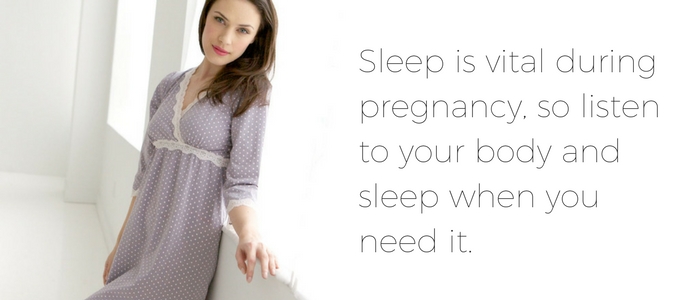
Pregnancy is a beautiful time in your life... but that's not to say that it’s easy. Non-stop physiological and hormonal changes can throw your body and mind out of whack, resulting in morning sickness, constipation, heartburn, sciatica, restless legs, strange cravings, fatigue and more.
Thankfully, you can find ways to overcome these common pregnancy problems by introducing certain habits.
1. Stick to a healthy diet
What you eat leading up to your pregnancy, during your pregnancy, and following the birth of your baby really does matter. Make healthy, nutritious choices along the way and you’ll be rewarded with energy and a healthy body while nurturing optimal development for your growing baby.
Eat foods like turkey, chicken, avocado, salmon, spinach, chickpeas, bananas, baked potato (with skin) and hazelnuts, and get vitamin B6 to relieve nausea and vomiting. Ginger is another good food to eat, so try brewing ginger tea before morning sickness arises.
Foods like beans, berries and broccoli are also great to boost your fibre intake and keep things running smoothly. High-fibre breakfast cereals and oatmeal are other options.
For heartburn, low-acidic fruit such as bananas and melon are good, and for energy, high-iron foods like red meat, leafy greens, beans and fortified cereals will help keep away fatigue.
2. Chew food thoroughly
Heartburn is common during pregnancy because progesterone, the hormone that relaxes muscles in pregnancy, also relaxes the stomach valve that keeps acid out of the esophagus. So, it’s important that you don’t overly stuff your stomach.
Chewing your food until it’s almost liquified breaks down larger particles of food into smaller particles to reduce stress on the esophagus. This also makes sure food particles are broken down properly to prevent constipation, bloating and indigestion-causing bacterial overgrowth.
Chewing food sends messages to your gastrointestinal system that food is on its way. This triggers hydrochloric acid production and digestive enzymes, speeding up the digestive process and reducing the chance of heartburn, indigestion and constipation.
3. Stay hydrated
When you’re dehydrated, your blood slows its movement through your body, making you feel sluggish. Staying hydrated is the key to keeping your energy levels up.
Hydration is also important to keep your digestive system moving, softening your solids so that they move steadily down the digestive path. Water therefore alleviates constipation, and helps prevent UTIs and hemorrhoids
Drinking water also keeps your body’s cooling system working and can keep pregnancy headaches at bay. It even gets rid of excess sodium in your body, minimising swelling in the feet and ankles.
Most importantly, proper hydration helps your body absorb essential nutrients into the cells and transports vitamins, minerals and hormones to the blood cells. It’s those nutrient-rich blood cells that reach the placenta and ultimately your baby. To boost this effect, try adding a slice of orange, lemon or lime and a tiny pinch of salt to your water.
4. Exercise
There are many reasons why you should exercise during pregnancy, including better weight control, improved mood, better circulation, and maintenance of your fitness levels. Regular exercise decreases the risk of pregnancy-related complications such as pregnancy-induced hypertension and pre-eclampsia, and can reduce back and pelvic pain. It also prepares you for the physical demands of labour and reduces your risk of complications during delivery.
Exercise can lower your risk of anxiety and depression, help you sleep and manage insomnia, and prevent and manage urinary incontinence. But while most forms of exercise are safe, some precautions are needed when pregnant. Talk to your doctor about the different levels of exercise and avoid raising your body temperature too high. Never exercise to the point of exhaustion.
5. Wear appropriate clothing
Tight clothing puts pressure on your already full abdomen and can worsen pregnancy-related heartburn. With this in mind, what you wear can have a big effect on your overall comfort and health.
During your first trimester, when bouts of morning sickness, nausea and indigestion are common, avoid tight trousers and dresses that are snug around the waist. Wearing tight clothing will only make your unsettled stomach wrestle more.
As you grow, look for clothes made of breathable, stretchy and super soft material to avoid overheating and discomfort. Choose maternity clothing over loose clothing that’s too big, as the wrong size clothing will only add to your discomfort. Choose dresses and skirts where possible, as these will allow your thighs to breathe

6. Switch to maternity bras
Traditional bras don’t have room for your diaphragm to grow during pregnancy. This puts pressure on your diaphragm, increasing your risk of chest pain. It can also decrease overall lung capacity and cause shortness of breath, meaning you and your baby don’t get adequate oxygen.
Traditional bras also offer underwire, which is not recommended during pregnancy. Underwire puts pressure on the milk ducts, blocking milk flow and putting you at increased risk of infection.
In general, breasts are ultra sensitive during pregnancy, meaning a comfortable bra is an essential accessory. Make the switch to a maternity or nursing bra (one that offers the three S’s - soft, stretchy and seamless) and allow room for your breasts to grow. Choose natural fabrics like organic cotton for ultimate breathability.
Read more on finding the perfect nursing bra here.
7. Prioritise sleep
Sleep is vital during pregnancy, so listen to your body and sleep when you need it. Take naps when you can and go to bed early to get a good night’s rest. If it’s comfortable for you, lie on your left side and tuck a pillow between your knees. This will align your legs and spine and reduce pressure on the sciatic nerve. Alternatively you can wrap yourself around a big body pillow to support your ballooning abdomen and reduce strain on your muscles. If you feel short of breath lying down, prop yourself up with pillows to ease the pressure on your lungs.
If you’re having difficulty getting to sleep, avoid technology before bed. If you’re having difficulty staying asleep because you need to get up and pee, avoid liquids before bed (providing you’ve drunk plenty of water throughout the day). If you do need to go to the toilet in the night, keep the light off to keep your brain in slumber mode.
8. Practice relaxation
Being calm and relaxed during pregnancy is important. With this in mind, avoid stressful situations and daily stressors like running late. Get up nice and early to ensure a relaxing start of the day and your day should hopefully continue that way.
Throughout the day, practice head-to-toe relaxation by getting in a comfortable position, closing your eyes, and breathing deeply a few times. Feel the muscles relax from the very top of your head, right the way down to your toes. Imagine tension slipping away with every breath you take, leaving peace and calm in its wake. Light a soy-based candle with a heavenly scent for hours of bliss and simply take time for yourself. You might not get any more of that for a while!
9. Walk more
When you feel like baby is sitting high up in your ribs or kicking their feet upwards towards your throat, stand up and go for a walk. This usually gives your baby the extra room he/she needs to sink down and get comfortable. Walking literally allows you more breathing room.
If baby still feels like they’re using your organs as a hiding place, get down on all fours and let your belly sag down.
10. Stay stylish
Wearing stylish clothing for emotional reasons is just as important as wearing practical clothing for comfort reasons. Women often say that the hardest part of being pregnant is the emotional toll it takes, and symptoms like depression and anxiety can arise. Wearing baggy, frumpy and unattractive clothing will do nothing to boost your spirits.
When you look fabulous, you feel great. With every compliment you get, you feel even better. Invest in a wardrobe of stylish, beautiful maternity wear items and not only will you feel confident every time you leave the house, you’ll limit the stress that comes from trying to find something comfortable to wear.
Try to remain you for as long as possible, while embracing the new you. If you normally love to wear jeans, for example, invest in a great pair of maternity jeans and enjoy the best of both worlds.
Putting things into perspective
It’s important to remember that although pregnancy comes with some unpleasant symptoms, you’re in control of how unpleasant these symptoms get. Recognise that you are doing something incredible and focus on the miracle inside you. Channeling your energy into the positives of your pregnancy will help make even the toughest symptom seem more bearable. Truly recognise the magic that is motherhood and the sacrifices of pregnancy suddenly aren’t sacrifices at all. They are little miracles of their own!
To learn more about symptoms you may experience during pregnancy, download our free guide to your pregnancy week-by-week.
